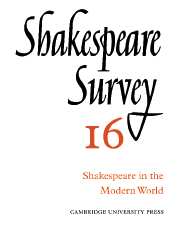Book contents
- Frontmatter
- An Obligation to Shakespeare and the Public
- Our Closeness to Shakespeare
- The Popularity of Shakespeare: An Examination of the Royal Shakespeare Theatre’s Repertory
- Shakespeare and the Fashion of These Times
- An Approach to Shakespearian Tragedy: The ‘Actor’ Image in Macbeth
- Shakespeare’s Impact Today in France
- Shakespeare and the Modern World
- Modern ‘Theatrical’ Translations of Shakespeare
- Shakespeare as ‘Corrupter of Words’
- Shakespeare in Ghana
- ‘Timon of Athens’
- Who Strutted and Bellowed?
- Shakespeare in Planché’s Extravaganzas
- ‘Our Will Shakespeare’ and Lope de Vega: An Unrecorded Contemporary Document
- Shakespeare and the Mask
- International Notes
- Shakespeare Productions in the United Kingdom: 1961
- Acting Shakespeare Today. A review of performances at the Royal Shakespeare Theatre, August 1962
- Canada’s Achievement
- 1 Critical Studies
- 2 Shakespeare’s Life, Times and Stage
- 3 Textual Studies
- Books Received
- Index
- Plate section
Shakespeare and the Fashion of These Times
Published online by Cambridge University Press: 28 March 2007
- Frontmatter
- An Obligation to Shakespeare and the Public
- Our Closeness to Shakespeare
- The Popularity of Shakespeare: An Examination of the Royal Shakespeare Theatre’s Repertory
- Shakespeare and the Fashion of These Times
- An Approach to Shakespearian Tragedy: The ‘Actor’ Image in Macbeth
- Shakespeare’s Impact Today in France
- Shakespeare and the Modern World
- Modern ‘Theatrical’ Translations of Shakespeare
- Shakespeare as ‘Corrupter of Words’
- Shakespeare in Ghana
- ‘Timon of Athens’
- Who Strutted and Bellowed?
- Shakespeare in Planché’s Extravaganzas
- ‘Our Will Shakespeare’ and Lope de Vega: An Unrecorded Contemporary Document
- Shakespeare and the Mask
- International Notes
- Shakespeare Productions in the United Kingdom: 1961
- Acting Shakespeare Today. A review of performances at the Royal Shakespeare Theatre, August 1962
- Canada’s Achievement
- 1 Critical Studies
- 2 Shakespeare’s Life, Times and Stage
- 3 Textual Studies
- Books Received
- Index
- Plate section
Summary
In the course of a very useful review of Elizabethan theatre studies over the past sixty years, Arthur Brown tells us that ‘we are still in a period of stock-taking’ and that we must ‘continue to apply ourselves to fundamental material, to minutiae if necessary, until we are perfectly certain that the foundations for broader and more general studies are secure’. Some will feel that this is the scientific spirit manifesting itself as the heroic caution of modern scholarship (as Brown says of the reception given to Hotson’s views of the round theatre, ‘Most scholars are prepared to be non-committal’). But others may recognize in our own period some of the signs of imaginative exhaustion. It is like the end of Uncle Vanya, where a routine of work is to keep us going somehow, so that future generations will profit and may even be grateful: ‘First, Uncle Vanya, let us write up the accounts. They are in a dreadful state. Come, begin. You take one and I will take the other.’
Our continuing eagerness to come to rest in objectively secured positions is a sign that our age is of a piece with that which, under the distant presidency of Auguste Comte, inaugurated the New Variorum Shakespeare. But the New Variorum, particularly in its earlier volumes,2 has been concerned less with fundamental material than with the ample and comprehensive recording of opinion; and it may be thought to have done less to consolidate objectively valid knowledge and understanding than to exemplify and testify to the fascinating relativity of critical judgement. It reminds us that understanding is a complex of knowledge and insight, and that each generation has (for all the swelling of windpipes) contrived to add something to the stock of relevant facts and to the current of relevant perceptions.
- Type
- Chapter
- Information
- Shakespeare Survey , pp. 30 - 41Publisher: Cambridge University PressPrint publication year: 1963



